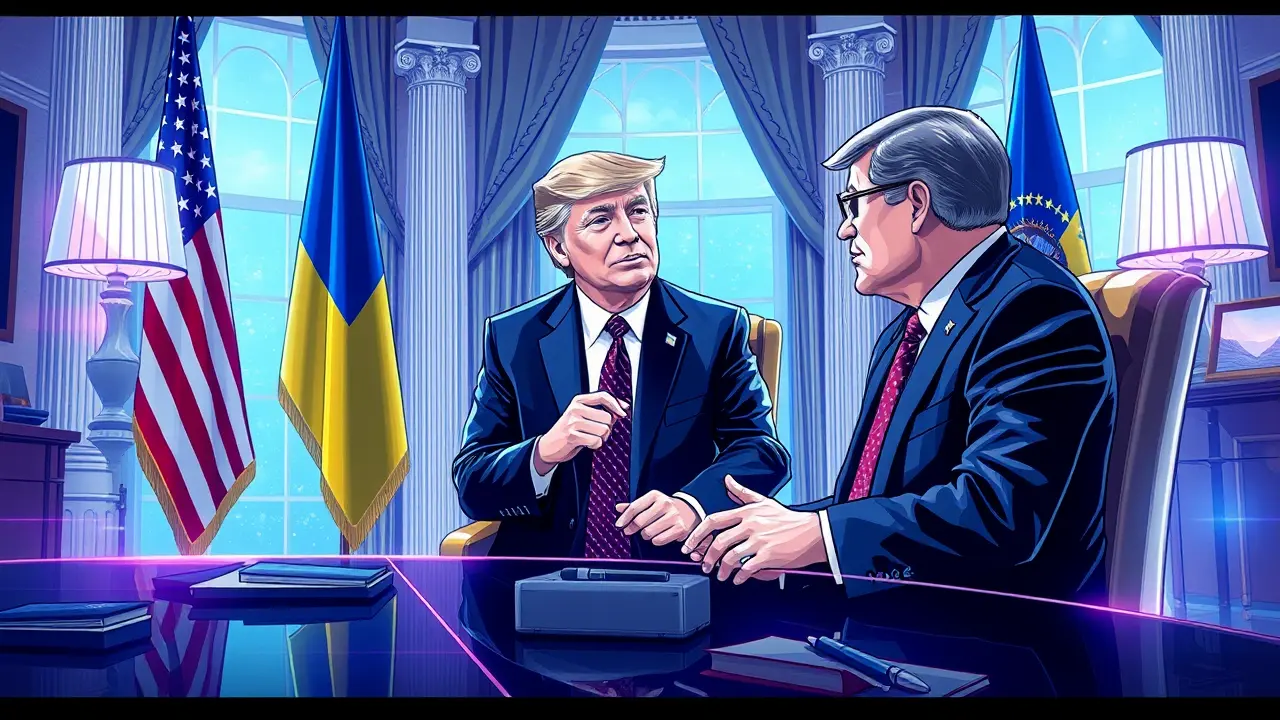Trump Meets Zelensky, Hopes to Avoid Sending Missiles
In a meeting that underscored the profound complexities of modern statecraft, US President Donald Trump adopted a notably reserved posture this Friday regarding the prospect of furnishing Ukraine with long-range Tomahawk missiles, a stance that placed him in a delicate diplomatic minuet with his counterpart, Volodymyr Zelensky, who arrived at the White House with the explicit aim of bolstering his nation's defensive capabilities against a three-year-old conflict with Russia that has simmered and flared since the 2014 annexation of Crimea. While President Zelensky, a political neophyte who rode a wave of popular discontent into office, sought to frame the conflict in Eastern Ukraine as a clear-cut struggle for sovereignty against Russian-backed separatists—a conflict that has claimed over 13,000 lives and displaced millions—President Trump consistently pivoted the conversation toward his anticipated peace summit with Russian President Vladimir Putin, an event he suggested could obviate the need for such significant military escalation, a strategic calculation that echoes historical precedents where great powers have sought to balance deterrence with de-escalation, much like the careful diplomatic maneuvers during the Cold War's various flashpoints.This divergence in priorities reveals a fundamental tension in international relations: the immediate, existential need of a nation under threat versus the broader, often more abstract, geopolitical chess game played by its powerful allies. For Ukraine, the Tomahawk missile represents not merely a weapon but a symbol of unwavering Western commitment, a tangible guarantee that its territorial integrity is non-negotiable; for the Trump administration, however, it appears to be a bargaining chip, a piece of leverage to be withheld ahead of a high-stakes negotiation with the Kremlin, a tactic reminiscent of realpolitik strategies employed by statesmen from Metternich to Kissinger, where client states' needs are often subordinated to the overarching goal of managing great-power rivalries.Analysts from the Rand Corporation and the Carnegie Endowment have long warned that providing such advanced weaponry to Ukraine could fundamentally alter the conflict's dynamics, potentially prompting a more aggressive Russian response and escalating a proxy war into a more direct confrontation, thereby shattering the fragile stability that has precariously held since the Minsk II agreements. Conversely, military strategists at the Atlantic Council argue that without a credible deterrent, specifically the capability to threaten Russian supply lines and command centers deep behind the front lines, President Putin has little incentive to negotiate in good faith, viewing any diplomatic overture from a position of perceived Western weakness as an opportunity to further his strategic aims.The body language and carefully parsed statements from the Oval Office meeting suggested a leader in President Trump who is more captivated by the grand spectacle of brokering a deal—a potential Nobel-worthy achievement, as some of his advisors have reportedly framed it—than by the granular, grim realities of trench warfare in the Donbas region. This is not without historical parallel; one can draw a line to Chamberlain's pursuit of 'peace for our time' at Munich in 1938, a well-intentioned but catastrophically misjudged effort at appeasement that ultimately empowered an aggressor, though the analogies are, of course, imperfect and hotly debated among historians.The subtext of the meeting was also unavoidably colored by domestic American politics, including the lingering shadow of the first impeachment and allegations that previous military aid to Ukraine was used as a political cudgel, a context that undoubtedly influences the current administration's risk-averse approach to further entanglement. President Zelensky, for his part, must now navigate a perilous path: returning to Kyiv without the promised arsenal risks emboldening his domestic opponents and the separatists, while publicly pressing too hard could alienate his most powerful patron. The coming weeks, leading up to the proposed Trump-Putin summit, will be a critical test of whether diplomatic outreach can succeed where years of sanctions and sporadic combat have failed, or whether this latest chapter is merely a prelude to a further militarization of a conflict that has already redrawn the map of Europe and challenged the post-Cold War international order to its core.
JE
Jenna Morrow123k2 days ago
not sure i see the big deal here tbh feels like we've heard this all before
0
JA
Jamie Wilson123k2 days ago
wow this is a lot to take in tbh it feels like everyone's just a pawn in a bigger game smh
0
